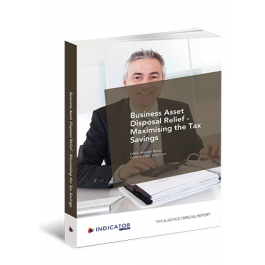Business Asset Disposal Relief - Maximising the Tax Savings
A Tips & Advice Special Report about...
In a nutshell
In no-nonsense language, this Special Report explains the steps you need to take to claim business asset disposal relief (formerly called entrepreneurs' relief). It's an invaluable guide for every business owner or shareholder - use it to legitimately keep those hard-earned profits out of HMRC's hands.
In detail
When you sell, transfer or wind up your business, you can benefit from business asset disposal relief. This means you'll only pay 10% tax on any profits or gains you make. But like most tax reliefs, there are conditions and tricky rules to contend with. This Special Report takes you through all the essentials of this complex topic, making it easy to understand:
- When to claim business asset disposal relief
- How to calculate it
- How to take full advantage of the relief
- What time limits apply
- The pitfalls you should watch out for
- Interaction with other reliefs
Plus, we've included a number of important tax cases to clarify the subject even further. So be sure to take full advantage and maximise your wealth.
We've created this Tips & Advice Special Report especially for...
Professional advisors and company owner managers and owners of unincorporated businesses with an eye on moving to a limited company that want to:
- Stay tax efficient under the rules
- Develop an effective profit extraction strategy
You'll get the following free extras with this Tips & Advice Special Report...
An online service with ready-to-use documents
- To immediately apply our advice and solutions in practice
- That you can easily adapt to suit your own requirements
In this Tips & Advice Special Report you'll read about...
1. How does it work?
1.1. What gains qualify?
1.2. What is a disposal?
1.3. How do I work out a gain?
1.4. What about gains on shares?
1.5. How do I calculate the tax on gains?
1.6. Is there a limit to the amount of gains that can qualify?
1.7. How do I claim BADR?
2. Sole traders and partners
2.1. What do I need to have done to qualify?
2.2. I’ve sold my business. How much of the gain qualifies for BADR?
2.3. Can I own a business for a short time and get the relief?
2.4. What about only selling part of my business?
2.5. What does HMRC say about it?
2.6. Can I sell my business in stages and still qualify?
2.7. How do I calculate the tax on a qualifying transaction?
2.8. What if I sell business assets after I stop trading?
2.9. If I sell assets after selling part of my business, will they qualify for relief?
2.10. What if one of the assets isn’t fully used in my business?
2.11. What if I owned the asset before using it in my trade?
2.12. How does BADR apply to business partners?
2.13. If I sell my share in the partnership will I qualify?
2.14. What if I have owned some of my partnership share for less than two years?
2.15. Does BADR apply if a partnership sells its assets?
2.16. I personally own assets the partnership uses. What’s the BADR position?
2.17. I rented assets to the partnership. Does BADR apply if I sell them?
2.18. What if the assets weren’t always used by the partnership?
2.19. What if only part of a property is used by the partnership?
3. Shares in companies
3.1. How does BADR apply to shareholders?
3.2. I’ve sold shares in a company. Does the gain qualify for BADR?
3.3. What’s the position if my company stops trading?
3.4. What counts as a personal company?
3.5. What are ordinary shares?
3.6. Can the shares be owned indirectly?
3.7. Is there a minimum period for share ownership?
3.8. Can I sell or transfer my shares in stages and qualify for BADR?
3.9. Can shares in all types of company qualify?
3.10. What’s the definition of trading company?
3.11. What are the problems with the definition?
3.12. Is a company trading if it also owns investments?
3.13. How can I ensure the trading requirement is met?
3.14. Are cash investments non-trading assets?
3.15. My company uses only part of a building for its business. Is this a problem?
3.16. Are holding companies trading?
4. Assets used by companies
4.1. My company uses buildings I personally own, does BADR apply?
4.2. What are the BADR conditions for personally owned assets?
4.3. What counts as “withdrawing from participation” in a company?
4.4. Can I sell some of my shares and claim BADR for other assets?
4.5. What if the company has ceased trading?
4.6. What if the property has not always been used by my company?
4.7. What if not all of the asset was used in the company’s business?
4.8. What if my company has not always been my personal company?
4.9. What if my company ceases to be my personal company because of a takeover?
4.10. What’s the position where the company has paid me rent for use of the property?
4.11. Does the period of rental make a difference?
4.12. The rent has changed year on year.
How do I deal with this?
4.13. What if I don’t charge rent but the company covers my mortgage repayments?
5. Furnished holiday lettings
5.1. What are furnished holiday lets?
5.2. What are the conditions to be an FHL?
5.3. What are the occupation conditions?
5.4. What if the occupation conditions are not satisfied?
5.5. I run an FHL. Do I qualify for relief?
5.6. Can a property that has not been an FHL qualify for BADR?
5.7. How does BADR apply if I own and let more than one property?
5.8. What if I sell the property after I stop letting it?
6. Families
6.1. Can I receive BADR on a transfer to my spouse or civil partner?
6.2. Do transfers between spouses have any effect on BADR?
6.3. What’s the position with jointly held assets?
6.4. Can jointly held assets be advantageous for BADR?
7. Interaction with other reliefs and losses
7.1. What’s the position if I make capital losses in the same year as gains?
7.2. I incorporated my business and didn’t pay any tax. Does this affect BADR?
7.3. Can I aggregate periods of ownership to meet the period of ownership condition?
7.4. What if I sell a business asset and buy a replacement?
8. Takeovers, shares and earn-outs
8.1. I sold my company by taking on shares in a new one. How does this affect BADR?
8.2. What are the tax differences and how might they affect me?
8.3. How does receiving QCBs as payment for shares affect BADR?
8.4. Why elect to pay the tax sooner?
8.5. Other than paying tax earlier is there a downside to making an election?
8.6. What if I am paid in instalments for my shares?
8.7. What if I overestimate the value of the earn-out?
8.8. What if the earn-out payment is made as shares?
9. Appendix: Case studies
9.1. Case study 1: Sole traders, spouses and assets
9.2. Case study 2: Gains, losses, relief and the annual exemption
9.3. Case study 3: Incorporation and property
9.4. Case study 4: Assets, companies and part use
9.5. Case study 5: Incorporation, takeovers and earn-outs
You can choose from the following options...
Paper
- The hard copy version
- Keep it on your desk or use it whenever you're offline
Digital
- The PDF-version
- Delivered to your inbox
Take a look at your options below.
Special subscribers' offer
£90.00
£70.00
Only if you already have a subscriptionStandard offer
£90.00
Special subscribers' offer
£90.00
£70.00
Only if you already have a subscriptionStandard offer
£90.00

Got a question? Call Customer Services
(01233) 653500


 (01233) 653500
(01233) 653500 







